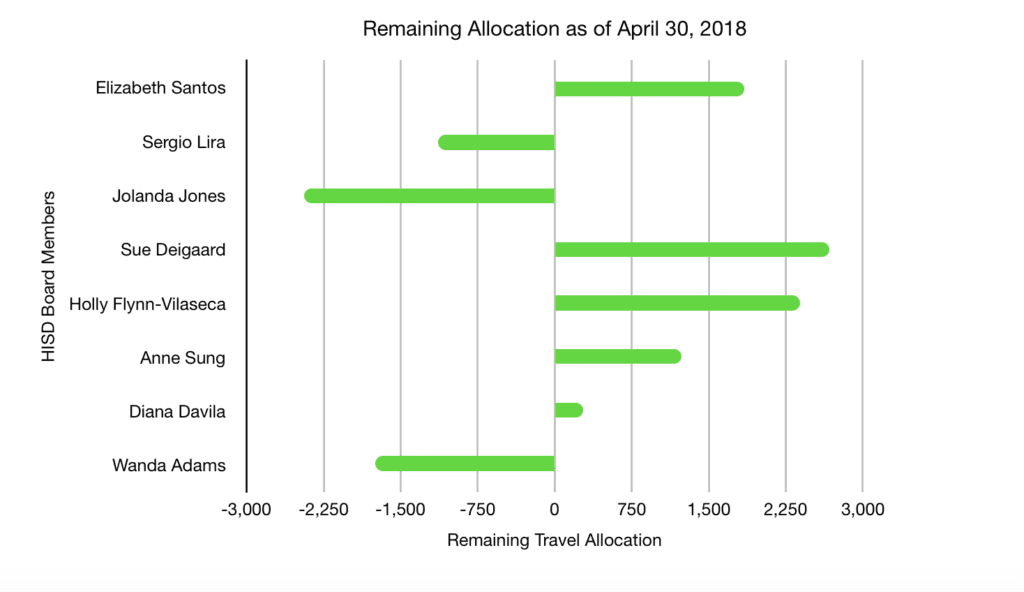Houston’s largest school district just passed a $2 billion budget in which trustees called for massive cuts to close a funding gap. Parents and students voiced frustration with the cuts, but would likely be even more unhappy to know that while the district’s elected officials are cutting staff, they’re enjoying travel allotments that allow them to traverse the state and country on taxpayers’ backs.
Houston ISD had to pass a budget by June 30, and facing a deficit, trustees needed to find cuts somewhere. They first took from the allotment for a proposed performance review, similar to an audit. Originally they planned to spend $2.5 million on the review, but cut that to $1 million and transferred the other $1.5 million to the general fund. Other cuts included custodians, fleet mechanics, maintenance staff, warehouse staff, HISD police department staff, and non-salary funding.
After passing the budget, embattled Board President Rhonda Skillern-Jones (District II) said, “We were trying to make sure we were making the most efficient use of our dollars. Our colleagues were concerned that we had not balanced the budget, but clearly, we are going from $116 million deficit last year to only a $18 million deficit this year.”
However, cuts came from everywhere except the trustee expense accounts, showing they weren’t that serious about “making the most efficient use” of taxpayer dollars.
HISD trustees are each given an annual $5,000 travel allotment through the budget process. Simply put, they set a travel budget for themselves every year. According to district policy, also set by the board, the allocation can be used for in- and out-of-district travel on almost everything: hotels, flights, conference and registration fees, mileage, meals, and parking.
Many trustees also use their allotment to pay for membership dues to organizations like the National Association of Latino Elected and Appointed Officials (NALEO), the Texas Association of School Boards (TASB), and the Texas Association of School Administrators (TASA), to name a few.
Trustees are required to submit monthly reports detailing their expenses. The reports are illuminating and show some trustees’ propensity for lavish accommodations.
Out of fiscal years 2017 and 2018, former Trustee Mike Lunceford was, by far, the most fiscally conscious on the board, spending only a few hundred dollars on registration for a TASB/TASA event. Lunceford served from 2009 until 2017, when he announced he would not seek reelection for District V. He was replaced by Trustee Sue Deigaard.
Unfortunately for taxpayers, Lunceford’s fiscal restraint doesn’t apply to the rest of the board.
On top of spending upwards of a $1,000 each stay at various Hyatt and Hilton hotels, Trustee Diana Davila’s (District VIII) trip to New Orleans included a stay at The Ritz-Carlton.
Trustee Wanda Adams (District IX), one of the most egregious spenders, spent $1,500 to stay at the Renaissance Hotel in Washington, D.C. when she traveled for a conference, deviating from her usual stays at the posh OMNI. District VII Trustee Anne Sung’s expenses include stays at San Antonio’s St. Anthony Hotel, “a luxury collection hotel.”
The policy the board has set for district employees put limitations on the travel of staff members, restricting their hotel stays to a “single room rate in a moderately priced hotel or at the conference/seminar rate.” The board has not set similar limitations for trustees, and from the district’s records they don’t care to hold themselves to the same standards.
On top of hotel stays, there are numerous other instances of overspending on what should be menial expenses like cab fare. Trustee Elizabeth Santos (District I) reported spending over $300 in cab fare on a two-day trip, while Trustee Sergio Lira (District III) spent nearly the same on a trip to New Orleans.
Overall, board members spent just under $10,000 on various forms of travel with the most coming from Adams, whose travel expenses exceeded $4,000.

As of April, Jones, Lira, and Adams have all exceeded their allotments by $2,438, $1,134, and $1,748 respectively — meaning they actually owe the district taxpayers a refund of that amount.
What’s worse than the excessive spending of trustees is the reporting on the spending. Documentation is inconsistent and unorganized, making it hard to ensure expenses are being reported accurately and trustees are held accountable. Some of the reporting on dates of expenses was so egregious that trustees were reported having arrived to a conference before the flight’s departure date from Houston. In other instances, descriptions for reporting were missing, and in more than a few reports trustees later changed the amount of previously reported expenses.
While they are allotted travel expenses, does that mean they should do their utmost to spend every cent? If gone unused, the funds revert back to the general fund where one would hope they would be put to good use, certainly better use than a stay at The Ritz-Carlton.
If the board’s entire travel program were zeroed out, would that provide enough money to stave off every cut made in this budget? No. But it speaks volumes about trustees’ priorities that their own expense accounts remain untouched while they eliminate positions the district could likely benefit from. It’s clear from their expenses that trustees are enjoying lavish tax-funded trips while the students of the 75-percent-economically-disadvantaged district suffer.
*Texas Scorecard requested travel documents from the entire board, but information for Board President Rhonda Skillern-Jones has yet to be provided by HISD.



